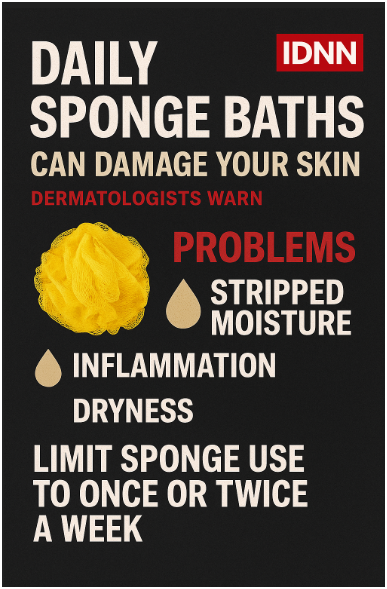Dermatologists Warn: Daily Sponge Bathing Can Harm Skin Barrier
Uyo, Nigeria | July 6, 2025 – IDNN Health Desk
A team of Nigerian dermatologists has issued a public advisory warning that daily sponge bathing, particularly with rough or unclean sponges, can lead to serious skin damage, infections, and chronic irritation.
The experts advise limiting sponge use to 2–3 times a week, stressing that over-exfoliation can weaken the skin barrier and expose the body to microbial invasions.
“Sponges exfoliate physically. But too much exfoliation leads to a broken skin barrier and a host of skin conditions,” said Dr. Edesiri Ighorodje, consultant dermatologist at the University of Uyo Teaching Hospital.
Damaging the Body’s Natural Shield
According to Dr. Ighorodje, the skin’s outer layer serves as a protective wall. Continuous scrubbing with loofahs or mesh sponges—especially in Nigeria’s hot, humid climate—can strip away natural oils, causing:
-
Dryness and scaling
-
Allergic flare-ups
-
Contact dermatitis
-
Higher risk of infection
“Many people think scrubbing harder means cleaner skin—but it actually makes the skin more vulnerable,” she warned.

Contaminated Sponges = Bacteria Party
Dr. Ifeanyi Umeh, a Lagos-based dermatologist, added that dirty sponges, especially ones reused for weeks without cleaning, can become breeding grounds for Staphylococcus, Candida, and Pseudomonas bacteria.
“You’d be shocked what’s living inside that loofah. If you’re not sanitizing or replacing it every 2–4 weeks, you’re spreading bacteria, not removing it,” Umeh said.
Special Warning for Bleachers and Sensitive Skin
People who use skin-bleaching products or who suffer from eczema, urticaria, or sensitive skin are at higher risk.
“We strongly recommend discontinuing sponge use entirely for those groups,” said Ighorodje.
Instead, experts recommend:
-
Gentle washcloth or hand-only cleansing
-
Moisturizing immediately after bath
-
Using mild, pH-balanced soap
Public Awareness Urged
Dermatologists are calling on health authorities and skincare influencers to educate the public on safe bathing practices.
“There’s a hygiene myth that more scrubbing equals better cleanliness. We need to change that mindset,” Dr. Umeh concluded.
IDNN VERDICT:
The truth is out: your sponge could be harming your skin more than helping it. It’s time Nigerians washed smarter, not harder.
📡 Follow IDNN Health for expert wellness tips, skin safety awareness, and verified advice on hygiene habits.
